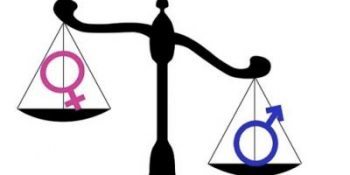
Over a century ago, 15,000 women marched in New York City demanding their voting rights, shorter hours and better pay. So why is it that we're still fighting for equal pay?
If we skip ahead to 2016, we’ve made a lot of progress in establishing voting rights and workers rights but gender parity is one issue that’s at the forefront of the conversation these days. As we celebrate International Women’s Day on March 8, it’s about time we unpack our own dialogue around equal pay and how we can reach gender parity.
You’ve probably heard the terms “gender equity” or “gender parity” a lot in conversations around International Women’s Day, which means the equal number of women and men and their access to education and health. Yet women are lagging behind men in economic participation and opportunity by 15 to 25 per cent in even the most gender-equal societies. Unfortunately, the stats don’t lie in that that women earn 77 cents to every dollar that a man makes in the U.S. or that the World Economic Forum reported that true gender parity would be achieved in 2133. That’s a full 118 years away, and it’s easy to get disheartened by these numbers, but there’s a real opportunity to act on the this year’s campaign theme to #PledgeforParity.

Jennifer Lawrence
Photo Credit: www.lennyletter.com
The Celebrities Speak Out
As gender parity becomes the theme to act on for many workplaces, it’s vital to look at how it can be improved and that starts with talking about it. It’s not accurate to say 2015 was the single year that the world woke up to the pay disparities in the workplace, but it was a year in which celebrities started speaking out. Jennifer Lawrence opened up about wage inequalities and feminism in an essay featured in Lena Dunham's "Lenny Letter" where she fretted over being seen as “spoiled” or “difficult” when negotiating her remuneration.
"When the Sony hack happened and I found out how much less I was being paid than the lucky people with dicks, I didn’t get mad at Sony. I got mad at myself. I failed as a negotiator because I gave up early. I didn't want to keep fighting over millions of dollars that, frankly, due to two franchises, I don't need."

Anupama Chopra and Anushka Sharma
Photo Credit: www.youtube.com
As Lawrence spoke out, so did Bollywood actresses like Anushka Sharma who talked about the small micro-aggressions on set like a larger room for the hero on outdoor shooting, and Priyanka Chopra, who spoke about complaining about low pay during a film shoot and was told the she could easily be replaced. Granted, celebrities are privileged folk who might not grapple with the same issues as their fans might, but they put a visible face to the gender discrimination that’s rampant in the film industry.
The #heforshe Campaign
Actresses like Priyanka Chopra and Emma Watson can be credited for the "mainstreaming" of the gender parity and feminism dialogue because initiatives like Girl Rising and #heforshe were big hits on social media with young women. Watson’s landmark speech at United Nations for the #heforshe campaign called on men to work in solidarity with women by listening and supporting feminist values.
Emma Watson addressing the gender parity issue at the UN.
Photo Credit: www.youtube.com
It’s a campaign that strongly resonated with Almas Jiwani, the president of UN Women Canada National Committee and the founder of the Almas Jiwani Foundation. Jiwani knew that she had to get involved in raising awareness about the campaign in Canada and the South Asian community.

Almas Jiwani
Photo Credit: www.ismailimail.files.wordpress.com

We are still looking for equality.
Photo Credit: www.edujesuit.com
“I think there is something unique to women that connects us all to each other in a way beyond race, beyond religion, beyond borders — something of a common bond along lines of compassion, unconditional love, and a deep desire to build a better future for our children. #HeForShe shed light on the fact that women can only put up so much of a fight, we also need men to recognize and reform a culture that disproportionately throws obstacles in the way of women, preventing us from gaining a seat at the table.”
As a South Asian woman, Jiwani has fought many barriers to get to her position, including the acknowledgement that women of colour are often paid much less than their white peers. Yet, Jiwani is confident that solidarity is one of the crucial factors in working towards gender parity in the workplace.
“A woman of colour who receives less pay than her white peers is symptomatic of a larger issue of inequality — one which everyone, whether black, white, man or woman, suffers from whether they realize it or not. There is no excuse for any of us not to fight for equality.”

The 2015 McKinsey Global Institute pay gap global study.
Photo Credit: www.womenleadinggovfiles.wordpress.com
It makes economic sense to further gender parity, because The McKinsey Global Institute found that South Asia (excluding India) scored the lowest on the scale, while North America and Oceania scored the highest with 0.74. Since there is room for improvement, India can improve its GDP by 16 per cent by 2025, and if the world works together towards this goal the global GDP could increase to $12 trillion in 2025.
Gender parity is something that can become a reality in our daily lives, but it starts in making that personal step in fighting for it. Whether that’s mentoring or sponsoring young women or taking part in the conversation on social media, make International Women’s Day the day you make that change in your own authentic way.
Main Image Photo Credit: www.idlo.int
Rumnique Nannar
Author
Rumnique Nannar is a new journalist with a passion for all things pop culture, film, and art. Rumnique was born in London, with a predilection for devouring English chocolate with her Vogue, ANOKHI, and Glamour magazines in tow. She is currently in her Journalism Masters at UBC. Connect ...














































































































